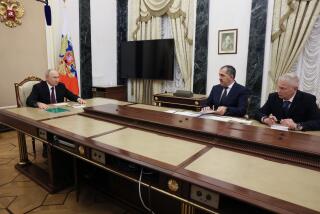Yeltsin Taps Nationalist as Defense Minister
- Share via
MOSCOW — In a balancing of the power scales between his security and economic gurus, Russian President Boris N. Yeltsin named a nationalist with a bloody track record as his new defense minister Wednesday and deployed him on the daunting task of army reform.
The long-pondered selection of Col.-Gen. Igor N. Rodionov appeared to strengthen the hand of Security Council chief Alexander I. Lebed, who had lobbied for his former colleague in Caucasus security operations for the defense job.
Rodionov, 59, replaces the ousted Pavel S. Grachev, and his appointment completes the security shake-up executed by Yeltsin a month ago when he sacked a hawkish coterie known as “the party of war” for embroiling federal troops in the Chechnya conflict.
The ascension of Rodionov to Yeltsin’s Cabinet was opposed by liberals within the Kremlin hierarchy worried by Rodionov’s reputation as an archconservative and his history of involvement in some of the army’s darker deeds. It was Rodionov who ordered troops to attack pro-independence protesters in the Georgian capital of Tbilisi in April 1989, a melee that left 19 dead. He has also been an outspoken backer of Serbian nationalists in Bosnia-Herzegovina and has close ties with the Arab world.
The new defense minister’s nationalist stripes were apparent in the high praise his appointment won from former coup plotters and xenophobes.
Albert M. Makashov, who led an armed charge on the state television headquarters during a Communist-led clash with Yeltsin in October 1993, lauded Rodionov as “one of the most honest generals” in the army.
Rodionov “has high theoretical skills, a gift of foreseeing and analyzing events and enjoys good personal contacts,” Valentin I. Varennikov, one of the leaders of the failed 1991 putsch against Soviet leader Mikhail S. Gorbachev, told the Itar-Tass news agency.
Ultranationalist Vladimir V. Zhirinovsky proclaimed full support for Yeltsin’s choice.
But the selection of Rodionov, a career soldier who has spent the last six years as head of the Academy of the General Staff, also elicited the backing of less radical figures.
“One very positive factor is that Rodionov is deeply respected by all ranks in the armed forces, and we will at last have a defense minister popular with the troops,” said Makhmut A. Gareyev, president of the Academy of Military Sciences.
Defense analyst Pavel Felgengauer of the newspaper Sevodnya said the appointment was based on merit and was surprising, considering Rodionov was actively campaigning for Lebed over Yeltsin during the just-completed presidential race.
“He’s not that fond of Yeltsin personally, but he’s ready to work for the good of the army and the country, and that should count more,” the military analyst said.
Rodionov has been urging the reform and rescue of the Russian army for years. He told Tass that lifting morale and increasing readiness in the armed forces are his top priorities.
Lebed’s clout within the Kremlin and his chances of becoming heir apparent were seen as declining after the swift renomination of Prime Minister Viktor S. Chernomyrdin after Yeltsin’s July 3 reelection victory. Monday’s appointment of liberal economist Anatoly B. Chubais as Yeltsin’s chief of staff further weakened the voices of nationalism within the administration.
Alexei G. Arbatov, deputy head of the lower house of parliament’s defense committee, told the Interfax news agency that he thought there were better candidates for the defense post and hinted that Yeltsin was trying to regulate the authority doled out to his top lieutenants.
“These are internal, very sly compromises relating to the balance of power within the executive branch,” Arbatov said, noting that Rodionov serves as a conservative counterweight to the liberal Chubais and that they respectively balance the positions of Lebed and Chernomyrdin as potential successors to Yeltsin.
“The president likes this,” he said. But it would be better for Russia, Arbatov concluded, if such appointments were made “proceeding from the criterion of professionalism.”
More to Read
Sign up for Essential California
The most important California stories and recommendations in your inbox every morning.
You may occasionally receive promotional content from the Los Angeles Times.














